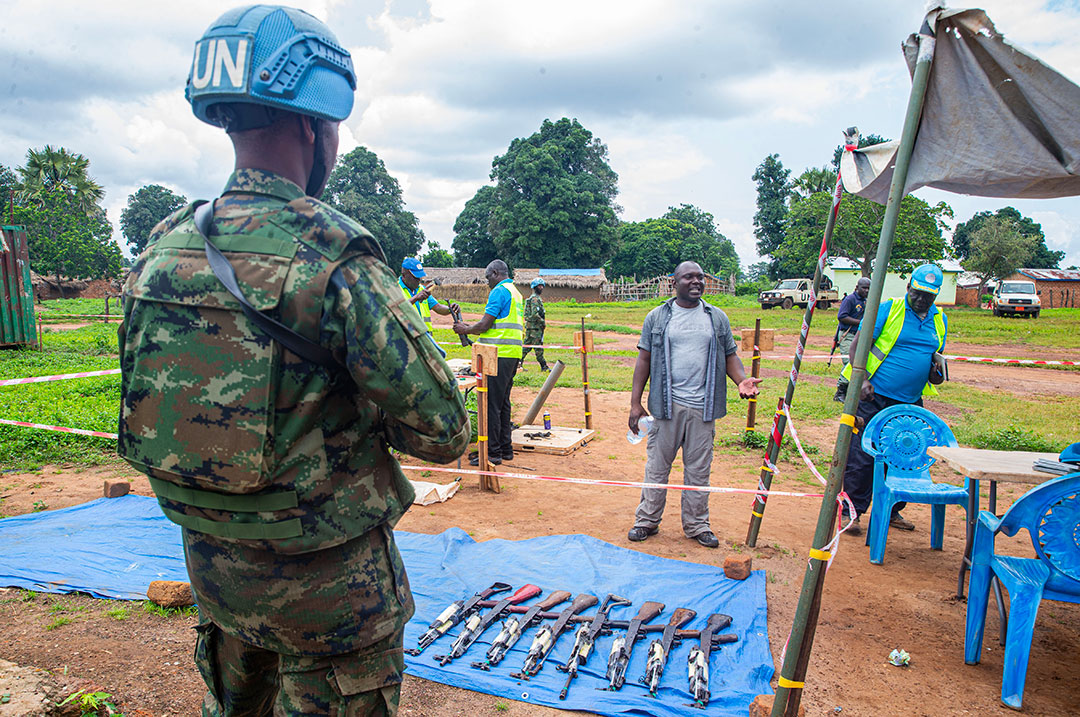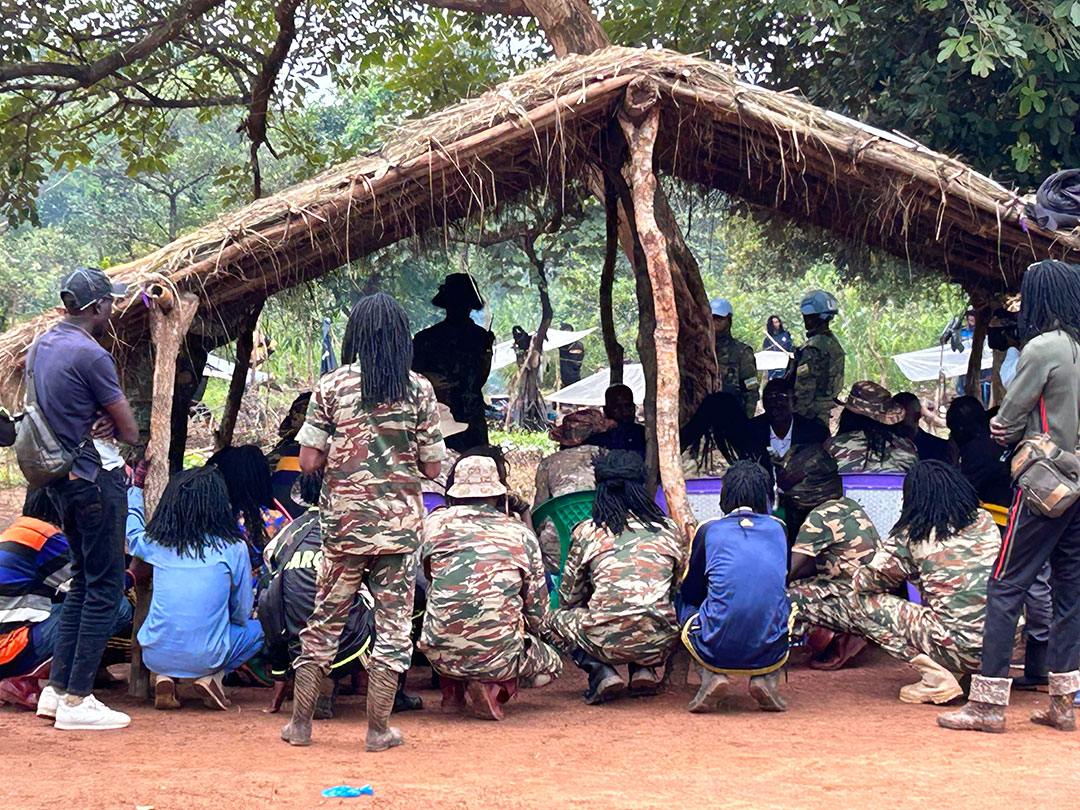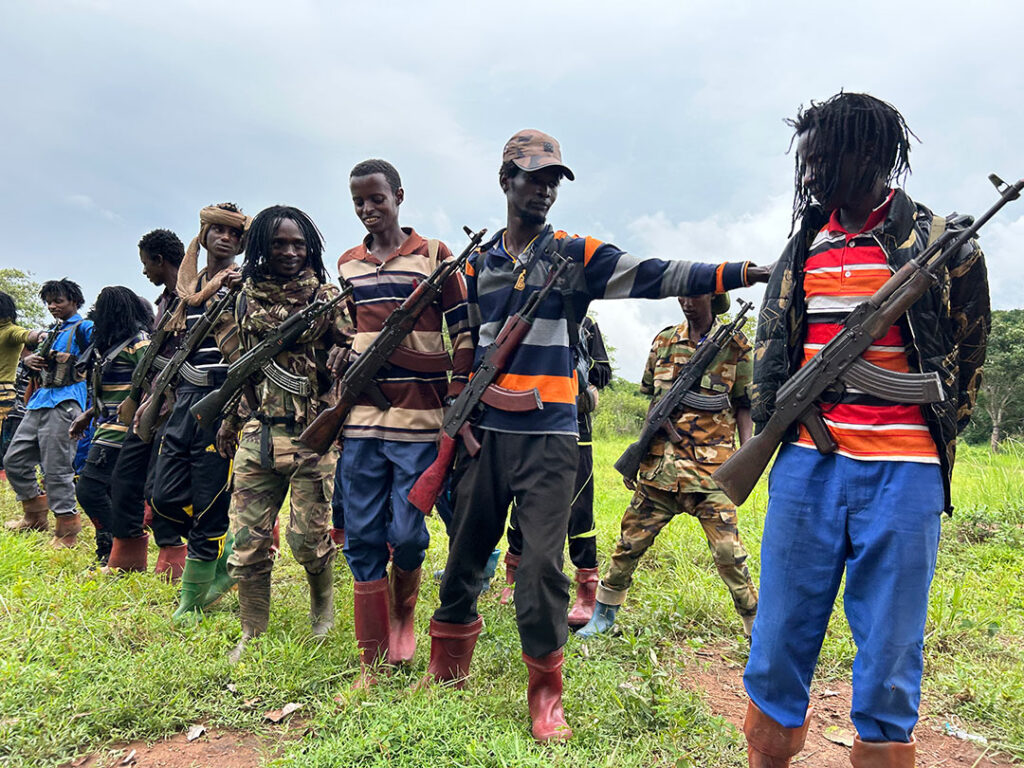Disarmament, demobilization and reintegration (DDR) are foundational pillars of peacebuilding, but they are never a one-size-fits-all solution. Each context demands a tailored approach, and the Central African Republic (CAR) is no exception.
After more than a decade of conflict and with 14 armed groups operating in the country, the CAR is working to offer a path for combatants to lay down their arms and begin the journey to a productive civilian life.
With the recent return of two major armed groups — Union pour la Paix en Centrafrique (UPC) and Retour, Réclamation et Réhabilitation (3R) — to the peace process, ongoing disarmament and demobilization will be essential for lasting peace.
This effort is evident in Maloum, Ouaka Prefecture, a designated disarmament hub, in the center of the CAR. UPC fighters arrive in groups of 15 to 25. They hand over their weapons and ammunition, then undergo a series of screenings, including medical, biometric registration, and assessment of readiness for integration into uniformed personnel or socioeconomic profiling. All say they are committed to peace.
“I joined the rebellion in Bambari in 2014 to protect ourselves, defend our property and ensure the safety of our families. But thanks to the agreement signed with the government, we have made a commitment to lay down our arms and actively contribute to building peace,” said combatant Abdoulay Atair.

Moctar Darsy said, “as sons of this country, it is our responsibility to contribute to peace.” Another combatant, Issa Abacar Salé, aspires “to go into business.”
The ongoing disarmament and demobilization operations in Maloum and in the northwestern town of Koui are conducted by the National Programme for Disarmament, Demobilization, Reintegration and Repatriation (DDRR) with support from the United Nations peacekeeping mission known as MINUSCA.
It comes after the signing of an agreement with UPC and 3R on April 19, 2025, in N’Djamena, Chad. The Republic of Chad mediated the agreement, and CAR President Faustin Archange Touadéra presided over the ceremony on July 10 in Bangui in the presence of UPC and 3R leaders, Ali Darassa and Sembé Bobbo, respectively.
In 2020, UPC and 3R withdrew from the 2019 Political Agreement for Peace and Reconciliation in the CAR (APPR) to join the rebellion within the Coalition of Patriots for Change (CPC), plunging parts of the country back into violence.
By returning to the peace process, the two groups have committed to cease hostilities and to fully participate in DDR, including by incorporating vetted armed group members into national defense and security forces and socioeconomically reintegrating ex-combatants based on their profiles and available opportunities. UPC leader Darassa has stated that “there is no turning back,” pledging the group’s “total commitment to peace.” Bobbo has similarly vowed to “respect the peace process.”
Since 12 July, more than 400 combatants have been demobilized and disarmed, the majority of them at Maloum.

As facilitator of the 2019 agreement, MINUSCA is providing financial, logistical, technical and security assistance for disarmament operations in Maloum and Koui. A MINUSCA joint team also is conducting awareness raising on the community violence reduction program and the opportunities it offers to ex-combatants who are not eligible for DDR or integration into national security and defense forces.
The National Disarmament, Demobilization, Reintegration and Repatriation Programme Implementation Unit, the technical body in charge of implementing the DDRR National Policy, and MINUSCA are engaged in related outreach to local authorities, community leaders, the local population and ex-combatants about the ongoing DDR process, and on conflict resolution, reconciliation and social cohesion. Authorities and especially the population have welcomed the operation. For Koui Sub-Prefect Lary-Nouradine Mahalba, “the role of local authorities in ensuring durable peace is crucial.”
Fueled by the DDR operations and the appointment of 3R and UPC representatives to government, the April 19 agreement and subsequent ceasefire are having a positive impact on security in areas where both armed groups have been active. Attacks on villages have decreased. Since UPC elements began gathering in Maloum in mid-July, no security incidents or acts of violence attributable to UPC have been recorded in the area.
The DDR process is a foundation for achieving lasting peace in the CAR. To this end, the government established the National Program for DDRR in December 2018, through which significant progress has been achieved. Along with the Maloum and Koui operations, the number of disarmed combatants stands at 5,540 to date, including 342 women affiliated with various signatory armed groups. The government is targeting an estimated 7,000 combatants from the 14 armed groups that signed the 2019 peace agreement.
The DDRR National Policy outlines that most of the disarmed and demobilized combatants transition through socioeconomic reintegration pathways with a limited group joining the security and defense forces. Since 2019, MINUSCA has supported the CAR government in implementing an inclusive and progressive DDR program and, in case of foreign elements, repatriation. The mission is helping mobilize CAR partners to “support this renewed momentum towards peace and reconciliation,” according to Valentine Rugwabiza, special representative of the U.N. secretary-general in the CAR and head of MINUSCA.
Other actors such as the World Bank, the United States, the European Union and the U.N. Peacebuilding Funds will be key in advancing DDR.
In an August 6 meeting, President Touadéra called for an urgent mobilization of DDRR partners “to support ongoing and future extraordinary DDR operations, as well as to finance socioeconomic projects to support communities hosting demobilized ex-combatants, and the socioeconomic reintegration of these ex-combatants into their host communities.”
The CAR is at a crossroads: Successful reintegration could turn ex-combatants into agents of peace and development, while DDR failure could fuel frustration and reignite tensions.

